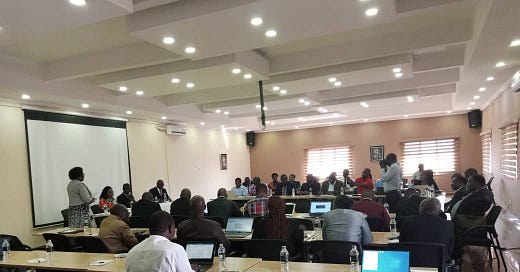AUDA-NEPAD Holds Expert Group Meeting to Finalize Genome Editing Training Programme and Modules
AUDA-NEPAD is conducting a meeting in Lilongwe, Malawi to review and finalize the genome editing training programme and modules developed by African scientists.
LILONGWE, MALAWI - The African Union Development Agency-NEPAD (AUDA-NEPAD) is convening an Expert Group Meeting in Lilongwe, Malawi, to review and finalise the genome editing (GEd) training modules developed by African scientists, regulators, and R&D experts, writes Winston Mwale.
The meeting, which will take place from August 14 to 18, 2023, aims to evaluate the zero drafts of the GEd training modules, which were designed for different stakeholder groups and tailored to the needs of the continent.
"This is an important step towards ensuring that Africa harnesses the potential of genome editing technologies in a responsible and sustainable manner," said Dr. Yusuf Mkungula, Principal Secretary for Natural Resources and Climate Change in Malawi.
"By building local capacity and promoting a common understanding of genome editing, we can contribute to the development of a thriving and ethical bio-economy in Africa," he added.
Florence Nazare, Head of the Centre of Excellence and Coordination at the African Union Development Agency-NEPAD (AUDA-NEPAD), paid tribute to Malawi for hosting delegates to the meeting on genome editing.
She noted that Malawi was the last country to validate its national communication plan on genome editing because it came later than the other eight countries.
Nazare also highlighted the importance of Africa going beyond its borders to access technology. She pointed out that Africa has been a consumer of products from elsewhere, such as Brazil and China.
She called on African countries to share insights so that they can be more agile in harnessing their own development, considering societal needs, research and development, and science.
Nazare said Malawi is the last country to validate its national communication plan on genome editing because it came later.
The initiative has received praise for its inclusive approach, involving stakeholders from various sectors, including government departments, the private sector, journalists, and the faith community.
The development of a national communication strategy is seen as crucial in fostering a better understanding of genome editing and promoting its adoption.
Professor Emmanuel Kaunda, Vice Chancellor of Lilongwe University of Agriculture and Natural Resources (LUANAR), expressed his enthusiasm for the project.
LUANAR, as a capacity-building institution in agricultural technologies, plays a key role in imparting knowledge to students and contributing to national food security.
Professor Kaunda emphasised the importance of collaboration between sectors for meaningful development.
The capacity-building initiative, which includes the validation of training modules for genome editing, is scheduled to take place from August 14th to 18th at the Crossroads Hotel in Lilongwe.
The initiative aims to equip participants with the necessary skills and knowledge to effectively utilise genome editing technologies and establish regulatory frameworks.
The GEd training modules will provide a standardised and systematic approach to training different stakeholder groups as part of national communication and advocacy efforts on GEd.
The objective is to promote a common understanding of GEd tools and their benefits to enhance their uptake.
The workshop will bring together national lead agencies, scientists, policymakers, research and development experts, and private sector representatives from the eight pilot countries involved in producing the zero drafts.
Through a systematic evaluation of the content, structure, and delivery methods, the review exercise will support the finalisation of the modules, ensuring ownership, impact, and sustainability of the national communication and advocacy efforts.
During the meeting, experts will assess the content, learning outcomes, teaching methods, appraisal strategies, and alignment with industry needs in order to ensure that the GEd training modules are comprehensive and effective.
They will also discuss the potential challenges and opportunities associated with implementing GEd in Africa.
The development of the GEd training modules is part of AUDA-NEPAD's broader efforts to promote the responsible and safe use of genome editing technologies in Africa.
Genome editing has the potential to revolutionise various sectors, including agriculture, healthcare, and environmental conservation. However, it also raises ethical, social, and regulatory concerns that need to be addressed.
By providing training modules, AUDA-NEPAD aims to equip African scientists, policymakers, and other stakeholders with the knowledge and skills necessary to make informed decisions about the use of genome editing technologies. The modules will cover topics such as the basic principles of genome editing, its applications in different sectors, risk assessment, and regulatory frameworks.
The Expert Group Meeting in Lilongwe will serve as a platform for experts to share their insights, experiences, and recommendations for the finalisation of the GEd training modules.
It will also facilitate collaboration and knowledge exchange among participants, fostering a stronger network of experts in the field of genome editing in Africa.
Once finalised, the GEd training modules will be disseminated to relevant stakeholders across the continent, including universities, research institutions, and government agencies.
AUDA-NEPAD will also provide support for the implementation of the training modules, including capacity building and monitoring and evaluation activities.
"I am confident that this meeting will be a success, and that it will help us to take a major step forward in ensuring that Africa benefits from the potential of genome editing technologies," said Dr. Mkungula.




